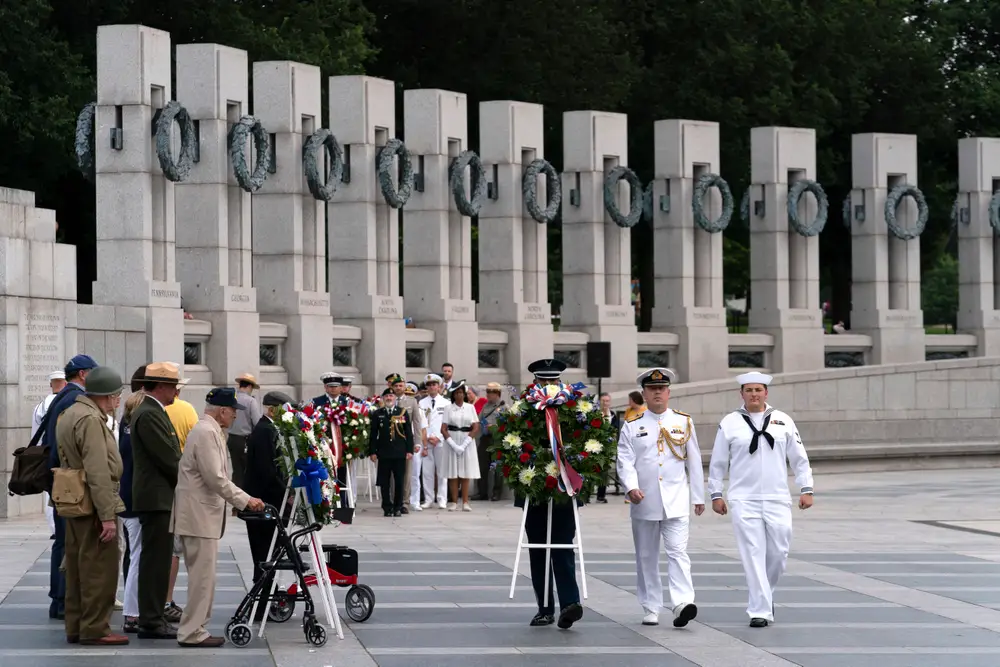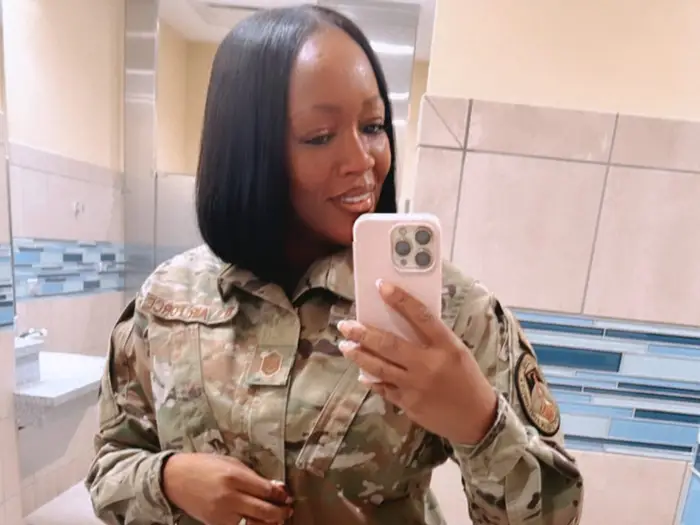Employers seeking skilled workers often overlook military veterans

Veterans “take a lot of pride” in their work after the military, one former military member told B-17.
Last summer, during her final month in the Air Force, Ashley Bethea cried almost every day.
Bethea, 40, felt on edge about giving up part of the identity she’d held since she was 18. She was also nervous about making it in a civilian job market, where she had no experience.
“For 21 years, the military was who I was,” Bethea told B-17. “I had no clue what corporate America looked like.”
Her predicament is one that often confronts military members attempting to shift from drills and missions to slide decks and sales targets.

Ashley Bethea retired from the Air Force in July.
Employers often face the inverse challenge: not knowing how veterans’ abilities might translate to a civilian workforce, executives who work with vets told B-17. These advocates for hiring veterans said that by looking a little closer at the skills undergirding veterans’ experience, employers could help plug gaps in their workforces.
Bosses who dig into veterans’ qualifications might like what they find. A 2023 LinkedIn report examining its users’ experiences said veterans were three times as likely as those who hadn’t served in the military to have a graduate degree or higher.
Yet at the same time, employers often overlook or discount military experience, LinkedIn found. The result: Veterans are only half as likely to rise to the level of director or VP even though they have almost double the work experience of nonveterans, the report said.
The gap exists even as more employers say they’re interested in prioritizing skills over pedigree. Even so, many hiring managers still scan résumés for four-year degrees and prior experience in a role, hiring experts previously told B-17.
A résumé for the private sector
Bethea, who retired from the Air Force at the end of July, turned to a nonprofit called Hire Heroes USA to help her translate her experience running logistics for deploying and returning airmen into something palatable to hiring managers. A representative from Hire Heroes helped Bethea craft her first-ever résumé.
“I just wanted to highlight that I could work all avenues of logistics, whether it be supply, transportation, people, equipment, or whatever the case was,” Bethea, a mother of three, said.
A Hire Heros USA advisor also helped coach Bethea on salary negotiations.
Ross Dickman, CEO of Hire Heroes USA, told B-17 that one of the biggest challenges for people leaving their service is explaining how what they did in the military can be helpful to civilian employers.
Dickman pointed to his own experience flying Apache helicopters during the dozen years he served in the Army.
“No employer really needs a helicopter that puts missiles into other things,” he said.
In addition to the obvious differences with civilian life, Dickman said, many members of the military chose to take on additional duties during the spare time they had while serving. That work might not be reflected in vets’ records and can be difficult to capture, he said.
“That is where it gets murky and hard for an employer,” Dickman said.
Dickman said Hire Heroes USA works to help vets communicate about the skills that they possess. These can range from abilities in manufacturing to prowess in so-called soft skills like conflict resolution and negotiating.
From there, Dickman said, Hire Heroes USA can go to employers and point to the abilities a veteran, service member, or military spouse possesses. Hire Heroes USA recently assisted its 100,000th veteran in the search for civilian employment, Dickman said.
Vets tend to excel, Dickman said, in roles involving consulting, customer service, operations management, logistics, analysis, and project management.
“They have a lot more skills that informed the way that they executed as an infantryman versus just knowing how to use a rifle,” Dickman said.
That was the case for Jesse Gartman, 41, who spent four years in the Marine Corps. In 2007, about a year after returning home from Iraq, he responded to an ad on Craigslist looking for movers in New York City. Gartman loved the work and the flexibility it offered. Plus, it was lucrative, and the camaraderie echoed what he’d found in the military.
Some three years later, with his back and shoulders hurting, Gartman decided he had what it takes to run a business. So, he started Veteran Movers NYC, employing mostly former military members. Gartman later sold that business and started another moving company in Oklahoma City, which he still owns. Now, back in New York City, Gartman is also doing business development work for another moving company.
Gartman said that in his case and that of many vets he’s worked with, they’re “just happy to be alive.” He added, “We take a lot of pride in what we do in life.”
Helping employers help vets
Trina Clayeux, CEO of Give an Hour, a nonprofit that provides mental health support to veterans and their families, told B-17 that employers offering affinity groups or employee resource groups for veterans can help ex-military members feel more at home in civilian roles.
Give an Hour also provides training and consulting services for employers on how to best support veterans.
Clayeux said that employers often see veterans in somewhat one-dimensional ways by thinking they’re good at getting things done or in leadership roles.
“They have so many other individual skills in between that they’ve picked up,” Clayeux said.
Clayeux said that’s why it’s important that hiring managers and supervisors should be curious about veterans’ experiences and the skills they can bring to a workplace.
A hiring manager’s curiosity came through for Bethea, the newly minted Air Force veteran. She recently began a job as a government contractor at the Pentagon. Bethea’s new role as a mission readiness airmen analyst builds on her decades of work in the Air Force.
“I enjoy logistics, and I still wanted to do it in my second life,” she said.






